Memoirs & Diaries - The Evacuation of Suvla Bay
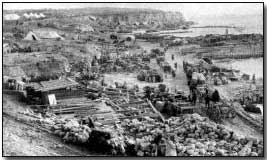 After six months'
training in Scotland I was as fit as drill, fresh air, and mutton stew could
make me. I could route march all day with full pack; I could make four
bulls at 500 yards; and I could run as far as any man in the battalion.
After six months'
training in Scotland I was as fit as drill, fresh air, and mutton stew could
make me. I could route march all day with full pack; I could make four
bulls at 500 yards; and I could run as far as any man in the battalion.
I was an efficient robot-soldier the morning I went on board the Olympic bound for Gallipoli. On the trip out from Liverpool to Mudros I was inoculated five times. My body was sore, my head ached, and my tongue stuck to the roof of my mouth. Before I landed I was a physical wreck.
The peninsula loomed up black and foreboding. The lighter that took my company from the troop-ship grounded on the beach and the men jumped ashore. The guns were booming along the whole Suvla Bay front; Verey lights sizzled in the sky and the orders were passed from one to the other in whispers. The men formed up near a shelter and moved off and then halted.
Gallipoli, and I was sick before I started. "Sergeant, you will go to the front line immediately," the landing officer told me.
"Follow me," a guide said; and I followed him with my men across the beach and up through a gulley into the darkness. When I reached the top of a hill a bullet whizzed over my head. I ducked and the guide laughed at me. I felt the top of my helmet.
The whole place smelt of sage and decaying flesh - a rich combination. So this was war! I stumbled on and on through the darkness with my fears. The machine guns rattled away on my left. The smell of death was everywhere.
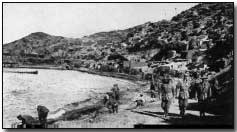 I
jumped into a trench. I followed the guide through the darkness.
I
jumped into a trench. I followed the guide through the darkness.
The guide was blotted out two paces in front of me. I would have lost him but for the click, click of his entrenching tool. I arrived with my draft at regimental headquarters without a casualty.
The adjutant came out of his dug-out. His clothes were covered with mud, his face had three-weeks' growth, and his left hand was bandaged. He had been struck with a bullet only a few minutes before.
"Nice clean lot of men you have," he said. "You are badly needed."
We were. Ten hours before a storm had swept the Peninsula of Gallipoli, and the ruin of it! Desolation everywhere. Thank God it was dark! It was better to have the first experience of trench life before the dawn.
I stumbled over men lying on the ground, moaning, crying in their agony; their legs frozen to their hips. There was an utter utterness about it. There was no one to attend to them; no one to carry them back to the beach. Everyone was demoralised; everyone was sick, waiting, waiting for the stretcher bearers who never came.
I had only a hundred men, and the adjutant divided them equally between the four companies. I was detailed to "C" Company. I was shown the communication trench. "You will find your company officer in a dug-out up there," the adjutant said.
I found the captain and reported to him. "Twenty-five men," he said. "What a landfall." It was just before the dawn. "We stand-to at dawn," the captain said to me. "Post some sentries; we haven't had any since the storm."
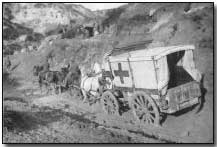 I posted the sentries and walked up and down the trench. I linked up
with the companies on my flanks. There was little rifle fire, but it
had its terrors. Everywhere I moved I stumbled over dead bodies; they
floated towards us on the receding flood. The dead bodies were washed
over the parapet, and the rains had opened the shallow graves. The
first hours in the trenches were horrible.
I posted the sentries and walked up and down the trench. I linked up
with the companies on my flanks. There was little rifle fire, but it
had its terrors. Everywhere I moved I stumbled over dead bodies; they
floated towards us on the receding flood. The dead bodies were washed
over the parapet, and the rains had opened the shallow graves. The
first hours in the trenches were horrible.
I worked for twenty-four hours. The next night I took out a patrol across the mud of No Man's Land. I fell into the abandoned trenches; I crawled through the water with two men after me. I got within 20 yards of the Turks' wire on my first patrol. I saw them digging in the darkness, improving their trenches and putting up new wire. They were as demoralised as we were.
The next morning the sun came up in a blaze of orange. It became very hot before eight o'clock and it was middle November. The company spent many days digging trenches to let the water run off from the front line. And there were orders for deep dug-outs as the winter loomed ahead.
There was not much sudden death, but there was slow death everywhere. The body was slowly dying from the inside. We talked to each other; we laughed occasionally, but always the thought of death in our minds - our insides were dying slowly.
The water was death; the bully beef was death; everything was death. I was afraid to eat a thing. It terrified me; it made me feel dead. A man would pass me holding his stomach, groaning in agony, and a few minutes later I would take him off the latrine, dead. The men contracted dysentery and fever every day. The bullets did not take a big toll. It was the death of germs.
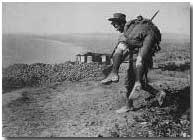 I
worked with my men all day and all night. I was lucky to snatch a few
hours' rest in the middle of the day. The company had now thirty men
to hold 200 yards of front.
I
worked with my men all day and all night. I was lucky to snatch a few
hours' rest in the middle of the day. The company had now thirty men
to hold 200 yards of front.
The sentries were posted at incredible distances apart. And for ever the patrols and the fatigues and digging day and night-digging, digging, infernal, intensive digging.
The company had been in the line twenty-five days; it was a record. There was no talk about going out for a rest; there was nowhere to go, only down to the beach, and the beach was shelled incessantly. It was safer in the line.
The food consisted of tea and biscuits. No meat. There was plenty of jam, but if a man was "fed-up" with war all he had to do if he wanted a nice bed on a hospital ship was to eat a tin of jam. Many a tired man looked longingly at the flaming red cross on the side of the hospital ship at night and opened a tin of apricots. They carried him away the next day or the day after.
There were rumours every day - cook-house rumours, latrine rumours, and trench rumours. They were always different. The regiment was doing this to-day and that to-morrow. No soldier will deny the psychological blessing of them. They were the hope of tired men, of fed-up men, and sick men.
They were lovely rumours, always original and timely. Nothing came of them. Dig and dig; patrol and patrol; raid and raid. Above all, over all, hopeful, glorious rumours! The company is going out of the line to-morrow for a month. The company has been ordered to Mesopotamia. The company is going to Egypt for the winter. There were rumours all day and all night.
One morning the captain called me. "Our trenches must be deepened 3 feet," he told me. Why, God only knew. They were quite deep enough if a man went about at the stoop. 3 feet deeper, and only twenty-five men left in the company to do the work. "Three days to do it, sergeant; and see it is done; don't care how." It was done.
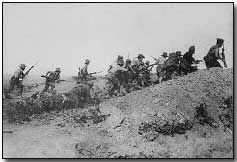 A few days later there was an incredible rumour. The General Staff
would pass along our trench at noon. The men had to scrape off the mud
with jack knives; they were given a pint of water to shave and, God above,
their buttons had to be polished. The joke of the deepening of the
front line trench was now obvious. The war must be made safe for the
generals.
A few days later there was an incredible rumour. The General Staff
would pass along our trench at noon. The men had to scrape off the mud
with jack knives; they were given a pint of water to shave and, God above,
their buttons had to be polished. The joke of the deepening of the
front line trench was now obvious. The war must be made safe for the
generals.
At noon the order was passed along to "Stand at attention." We did, and Lord Kitchener passed and his general's cap was just six inches below the parapet. There were a number of Staff officers following him, and as they passed around the traverse of the trench their footsteps seemed to echo: "It's hopeless! It's hopeless!"
The next morning the company officer called me into his dug-out. He was a hard drinker and a brave officer. "There are rumours of an evacuation, sergeant," he said. "Kitchener does not like the look of it for the winter; but there is nothing official. Perhaps we shall have good news to-night."
I smiled as I went back to my trench. When did the British Army ever retire? It was impossible. Here for ever. Flies in a spider web - million to one against ever getting out. Evacuation, no! I was sorry for those sick men who would believe the story. There would be more raised hopes, more denials, and more silly talk.
However, the impossible did happen. It was to be in ten days, the captain told me. Ten days, and the regiment would go to Egypt, the captain said - perhaps Cairo, certainly Alexandria. It was not a bad war after all!
The remaining days were full of feverish activity. Small mines were sunk; bully beef tins were filled with explosives and scores of rifles with time fuses were stuck about the trenches. I worked like a galley slave all day and all night. The British Army was going to leave the ghastly place and outwit the Allahs on the opposite hill. Yes, the British Army would sneak away in the night under the cover of darkness.
What a story to tell my grandchildren! "Once upon a time, my young hearers, I fought in the rear-guard action when my regiment ran away from Johnny Turk at Gallipoli."
The days passed with the usual routine work. There were only fifteen men now to carry on, and there were still three days before the evacuation. Three days! Would I get away safely? The web was drawing closer around me, around the company, around every man left at Suvla Bay. What if the Turks suspected?
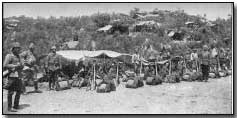 The preparations were completed. I was detailed to fight the
rear-guard action with five other men. I should do something to win
the War. There was a conference in the company officer's dug-out to
talk over the latest plans. In twenty-four hours, with a bit of luck,
I should be sailing down the coast in a destroyer.
The preparations were completed. I was detailed to fight the
rear-guard action with five other men. I should do something to win
the War. There was a conference in the company officer's dug-out to
talk over the latest plans. In twenty-four hours, with a bit of luck,
I should be sailing down the coast in a destroyer.
I went back to the trench and made up a bed on the firestep. I lay down and pulled a blanket over my shoulders and closed my eyes. A pain shot through my belly, a terrible biting pain. My whole body ached and ached; but tomorrow it would be good-bye to Gallipoli for ever. I slept, a sleep of pain, incessant pain.
"Stand to! Stand to!" Someone poked me in the ribs with a rifle butt. I sat up and rubbed my eyes. I tightened my belt and felt for my rifle. I stood on the fire-step and peered through the dim light out over No Man's Land. I felt a throb in my head; a rush of blood through my body. Darkness... black... black... darkness.
I was warm and snug. I woke up and looked around me. Where was I? In hospital - a whitewashed room with many beds. I did not ask any questions; I was still and quiet. I wished I would feel so warm and peaceful throughout eternity.
A young nurse came to my bed: "Sister! Sister! No.10 has come round!" She smiled at me, a lovely smile.
"Nurse, where am I?" "Malta," she answered, and she mentioned the place as if it were only a few hundred yards off W. Beach, Suvla Bay.
"Malta! " I mused. "Not Egypt... What happened?... The evacuation?..."
I slept again. When I awoke I took more interest in the ward and the beds around me. A patient in the next bed was reading a London newspaper. I saw the headline: "Suvla Bay Successfully Evacuated".
Sergeant W. H. Lench enlisted early in January 1915, at St. John's, Newfoundland, and arrived in England in April the same year. Joined the 1st Newfoundland Regt. at Edinburgh, and finished training at Stobs Camp, afterwards going to Gallipoli, where his regiment was attached to the 29th English Division, the only colonial unit that fought at Suvla Bay. At Gallipoli until the day before the evacuation, was in hospital in Malta, and sent back to England for convalescence in April 1916. After months in London hospital became staff instructor at the regimental depot at Ayr, Scotland, until March 1917, when he went to France, and was gassed near Monchy Le Preux in June 1917. Invalided home to St. John's in July 1918, discharged unfit for further service.
First published in Everyman at War (1930), edited by C. B. Purdom.
Photographs courtesy of Photos of the Great War website.
Russia mobilised 12 million men during the war; France 8.4 million; Britain 8.9 million; Germany 11 million; Austria-Hungary 7.8 million; Italy 5.6 million; and the USA 4.3 million.
- Did you know?
